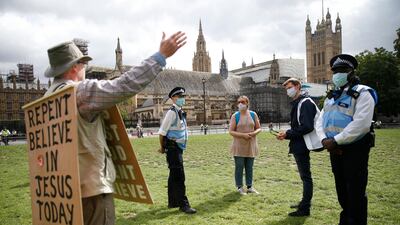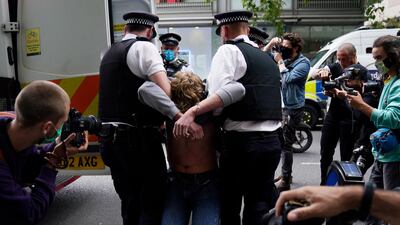Last week, Extinction Rebellion wielding hammers and tools labelled with "Love" and "We Act with Love" smashed at least 19 windows of the HSBC headquarters building in Canary Wharf, Tower Hamlets, the borough where I am an elected councillor and climate change campaigner.
Of the nine women arrested and charged with criminal damage, none were from Tower Hamlets. Earlier this month, climate change activists smashed the windows of Barclays Bank headquarters, also in Canary Wharf. In 2019, Extinction Rebellion activists blocked the transport system in Canary Wharf by gluing themselves to trains.
These protests were against the banks’ links to the fossil fuel industry. I am sure I am not alone in thinking that climate change campaigners gain no sympathy when they cause criminal damage, disrupt the lives of people by blocking streets or stopping trains from running.
The irony is, of course, that repairing broken windows, creating traffic jams and the use of glue (often containing hydrocarbons made from fossil fuels) all have a negative impact on the environment. From the goggles, hammers and chisels that they used to smash the windows to the clothes, masks and make-up they wore, to the mobile phones used, much of these things contained hydrocarbons.
Almost two decades ago, I helped put a campaign together to raise awareness about domestic violence in my borough, especially amongst Bangladeshi women and those from diverse communities. The campaign was called “What’s Love Got to Do With It?” with an image of a man attempting to kick a woman. In a borough where I was the first elected member to bring police officers, mothers and community leaders to work together on searches for lethal weapons such as hammers used for street and gang fights, what sort of message does smashing bank windows using hammers labelled “Love and tools with “We Act with Love” convey?
In Tower Hamlets, where knife crime and gang violence are high, impressionable young people may consider the Extinction Rebellion protesters' actions as an example to be followed. A young man just out of prison said to me: "If those white women can smash Barclays windows in Canary Wharf, why can't we smash the town hall windows for cutting youth centres?"
My answer was simple: you cannot go around causing criminal damage and putting yourself and others at risk just because you don’t like something.
Not only have people from ethnically diverse backgrounds been primarily invisible in the climate debate and protests, but they are also disproportionately affected by air pollution, not least because areas of London with the highest levels of pollution are occupied by a large diversely ethnic population. Most people will recall the tragic case of Ella Kissi-Debrah, the nine-year-old who became the first person in the UK to have air pollution listed as the cause of death on their death certificate, following a landmark inquest ruling last December.

The Archdeacon of Croydon, the Venerable Dr Rosemarie Mallett, is a leading figure within the Church of England on climate change. Her aim is to give a voice to those who are keen to bring about change but fear the repercussions of doing so. During Extinction Rebellion protests, people from ethnically diverse backgrounds fear being targeted by the police in a less favourable way than white protesters.
Athian Akec, the member of the UK Youth Parliament for Camden and a campaigner on knife crime, Brexit and climate change, said: “One friend of mine was stop-and-searched by the police 12 times last year. When I told him that the Extinction Rebellion protesters were purposefully getting themselves arrested, he rolled his eyes in sheer irritation. That’s not an option for black people."
While climate change is a huge problem and needs to be addressed urgently, there are ways of doing this peacefully and without causing criminal damage. Greta Thunberg led a protest with school children, which led to a global movement, but she never smashed windows.
Violent protests have an adverse effect on boroughs such as mine, where there are diverse communities that are so often excluded from the climate change debate and have no means of escaping from their often-violent circumstances. Climate change affects everyone irrespective of their race, so in order to bring about real change, we need to involve diverse voices, not just those who are capable of shouting the loudest. We cannot alienate people who support the principle.

Academic Maxwell Ayamba set up the Sheffield Environmental Movement in 2016 to work with diversely ethnic communities and promote access to Britain’s countryside. He said: “When I go to seminars, conferences, environmental meetings, I’m almost always the only black person. We have to listen to people, as well as teach them. We have to make people feel part of things, not belittle them – that creates apathy. We can’t have an individualistic, selfish way of thinking about nature.”
Not only is my borough home to the UK’s main financial district of Canary Wharf, but it has a huge Muslim community and people from diverse backgrounds. We are proud of our diverse and vibrant borough in the East End of London – and we want to create and build a greener environment and economy.
In my own fight to include people of colour and faith in the climate change debate, I’ll be advocating for Greta’s style of protest, especially for young Muslims and people from ethnically diverse backgrounds, not for wielding hammers with trendy slogans.
Rabina Khan is a councillor in the London Borough of Tower Hamlets and a special adviser. Her book My Hair Is Pink Under This Veil will be out in May









